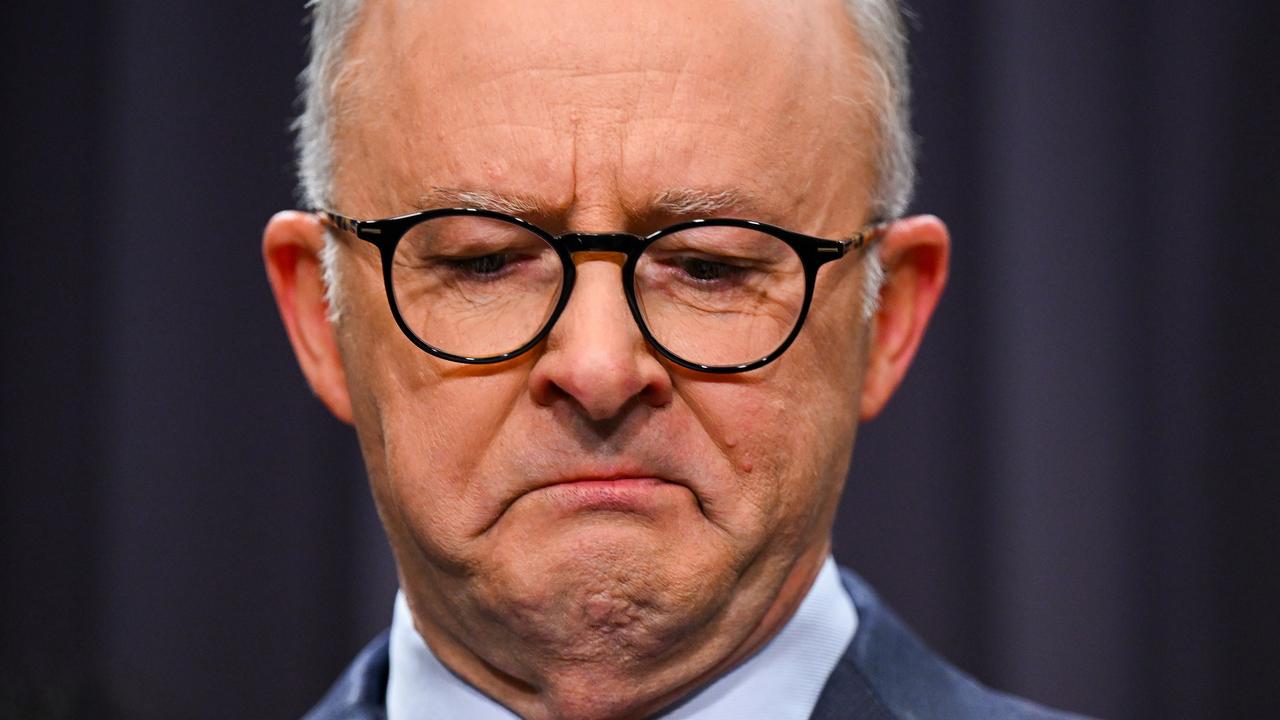Mike O’Connor: Anthony Albanese’s tears on Voice raise suspicions
OPINION: An Australian prime minister shedding tears in public is not unprecedented. But Anthony Albanese’s ‘lip-quivering performance’ over the Voice to parliament made me suspicious, writes Mike O’Connor.
When I was very young, a birdie took my bikkie. It was a kookaburra and it swooped down as I was sitting on the back steps of our house and snatched my biscuit – a scotch finger as I recall – from my hand.
According to my mother, this caused me to appear in the kitchen doorway and with my lips quivering like leaves in a storm to declare “a birdie took my bikkie!”
I was reminded of the birdie and the bikkie last week while watching Prime Minister Albanese’s lip-quivering performance.
The bikkie in question was the Voice while the birdie was represented by all those dreadful people who refuse to support a far-reaching change to our constitution based on the assurance that if they back it, they’ll feel good because it’s “the right thing to do”.
Their insistence on detail and a widening suspicion that the Voice might be an attempt at a power grab by an exceedingly small but vocal minority are threatening to snatch the PM’s bikkie.
The PM’s response has been to reach for the Kleenex. Call me a cynic – you will anyway and I can live with it – but whenever a politician resorts to tears to garner support, I become suspicious.

Bob Hawke was a great crier, but he chose his moments. He cried following the Tiananmen Square massacre in China and he wept when discussing his daughter Rosslyn’s drug problems, but he didn’t use tears to push political arguments.
Some politicians reserve their tears for those occasions when something unfortunate has befallen the most important person in their lives, this being themselves, such as when Kevin Rudd shed a tear when he was rolled by Julia Gillard, thereby following in the tradition set by Malcolm Fraser, who cried when Bob Hawke beat him in the federal election way back in 1983, while over in the US, Hillary Clinton suffered an attack of the weeps when she was beaten in a primary contest by Barack Obama.
Back home, Malcolm Turnbull is a dab hand with a hanky and fought back tears while being interviewed following the death of Queen Elizabeth, and former Queensland premier Anna Bligh became emotional when talking about the victims of the 2011 floods.
Some tears, then, can be forgiven, but when politicians use them in an attempt to attract sympathy for a cause, it should give us pause to think that perhaps they are being employed to distract attention from the substantive issues at stake in a cheap attempt to generate emotive support rather than clinical, intelligent analysis.
Some people, moved perhaps by the PM’s Oscar-worthy performance, might not bother to ask why he refuses to disclose the Solicitor-General’s advice on the Voice. It’s been used by Labor on a number of occasions to buttress its position, but now, suddenly, we are told that it is not the convention to do so.
Judi James, a UK-based behavioural expert on lip-quivering, eye-dabbing politics says politicians believe it will increase their support by making people warm to them.
“Crying has a profound effect on someone,” she says. “It’s something that babies do to get nurture and attention and love, and we are almost hardwired to have an empathetic response and a sympathetic response and that will still occur,” she says.
She uses as an example UK PM Tony Blair’s “Diana moment”. She says the former prime minister began a new trend in politics when he publicly blinked back tears after the death of Princess Diana.
But the act soon lost its effect, she says, as the British began to get more wary of Mr Blair’s emotional displays. “He would begin to do the ‘blinking back the tears’ as a political gesture, and that was when people began to doubt it. It began to look rather contrived,” she said.
Ms James says that while politicians may shed a tear, the rest of their body language fails to match up. “Genuine tears make us desperate to hide our faces,” she says.
Contrived? In politics? Surely not.
It was NSW premier and Labor hard man Neville Wran who said of his rough and tough working-class upbringing that “Balmain boys don’t cry”. Mr Albanese grew up in Camperdown. Perhaps that’s the difference.
French novelist Jean Giraudoux had the final word on political tears when he said: “The secret of success is sincerity. Once you can fake that, you’ve got it made.”
Read related topics:Anthony Albanese



